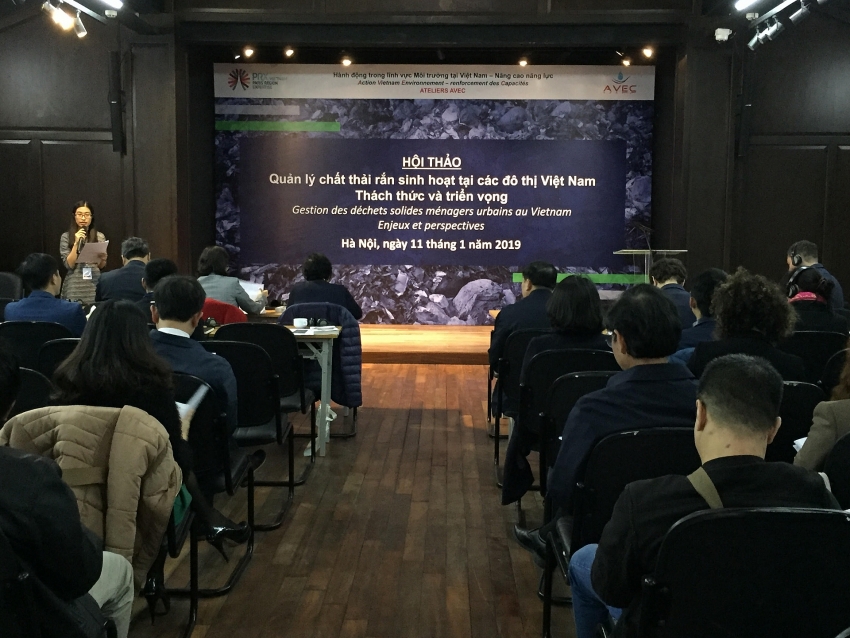People’s awareness plays a key role in handling solid waste
 |
| People’s awareness plays a key role in handling solid waste |
So far, the whole country has 228 urban areas housing nearly 34.7 million people, accounting for 35.92 per cent of the population. These are also the areas discharging the highest volume of waste.
According to Dang Anh Thu, deputy director of the Technological Infrastructure Department under the Ministry of Construction, urban areas discharge 38 tonnes of solid waste a day, but the collecting rate is only slightly more than 85 per cent. “The solid waste discharge in urban areas is forecasted to be 30 million tonnes and 40 million tonnes per year by 2020 and 2025, respectively,” she said.
Meanwhile, Vu Trung Thong from the Center for Architecture Planning 4 said, “Most people still throw trash out on the streets, into ponds and rivers. Especially, after big ceremonies or football matches, the streets are filled with plastic bags, bottles, and single-use products.”
“Vietnam produces too much domestic waste every day. Large amounts of waste, including plastic, have a bad impact on the environment as well as Vietnam’s attractions for tourists and investors,” Emmanuel Cerise, Paris Region Expertise Vietnam, told VIR.
At the conference, experts discussed handling solid waste. Currently, in Vietnam there are three alternatives to handle solid waste: burying, burning, and turning it into fertiliser.
“In Vietnam, there are only 44 facilities turning solid waste into fertiliser, 23 of which have a capacity of 100-500 tonnes a day. There are also 208 facilities using burning technology, 72 of which have a capacity of 5-10 tonnes a day. 193 out of 806 burying sites have a capacity of nearly 5,000 cube metres. Only nearly 20 per cent burying sites are hygienic,” Thu said.
Talking about the safe handling of solid waste, Emmanuel affirmed, “Both burning and burying have bad effects on the living environment, polluting the air and water sources. The important thing is collecting and sorting waste at the source.”
He also added, “People should also change their behaviours, use less or even stop using plastic bags and single-use products. Then, the amount of waste as well as the cost of collecting and sorting waste will be reduced.”
Agreeing with Emmanuel, experts said that people’s awareness is more important than the government and enterprises’ efforts. Communicating about harmful effects of waste, particularly waste that is hard to decompose, can help change people’s habits and reduce their environmental footprints by using greener products and sorting waste at the source and putting trash at the right places.
What the stars mean:
★ Poor ★ ★ Promising ★★★ Good ★★★★ Very good ★★★★★ Exceptional
Related Contents
Latest News
More News
- Bac Ai Pumped Storage Hydropower Plant to enter peak construction phase (January 27, 2026 | 08:00)
- ASEAN could scale up sustainable aviation fuel by 2050 (January 24, 2026 | 10:19)
- 64,000 hectares of sea allocated for offshore wind surveys (January 22, 2026 | 20:23)
- EVN secures financing for Quang Trach II LNG power plant (January 17, 2026 | 15:55)
- PC1 teams up with DENZAI on regional wind projects (January 16, 2026 | 21:18)
- Innovation and ESG practices drive green transition in the digital era (January 16, 2026 | 16:51)
- Bac Ai hydropower works stay on track despite holiday period (January 16, 2026 | 16:19)
- Fugro extends MoU with PTSC G&S to support offshore wind growth (January 14, 2026 | 15:59)
- Pacifico Energy starts commercial operations at Sunpro Wind Farm in Mekong Delta (January 12, 2026 | 14:01)
- Honda launches electric two-wheeler, expands charging infrastructure (January 12, 2026 | 14:00)

 Tag:
Tag:
























 Mobile Version
Mobile Version